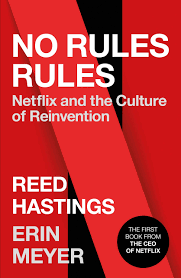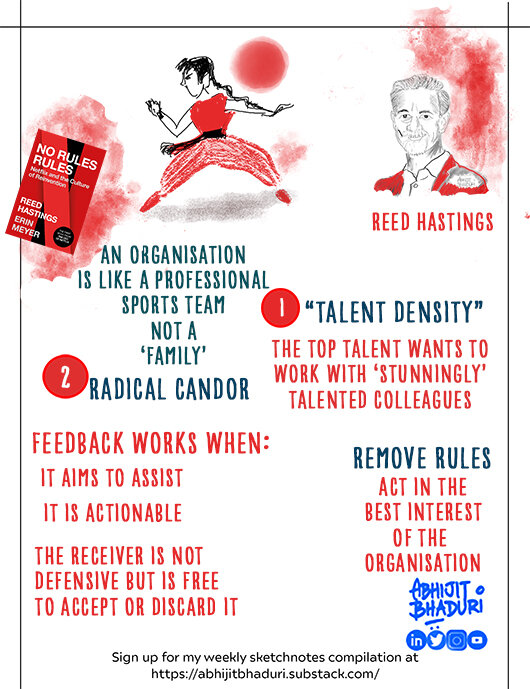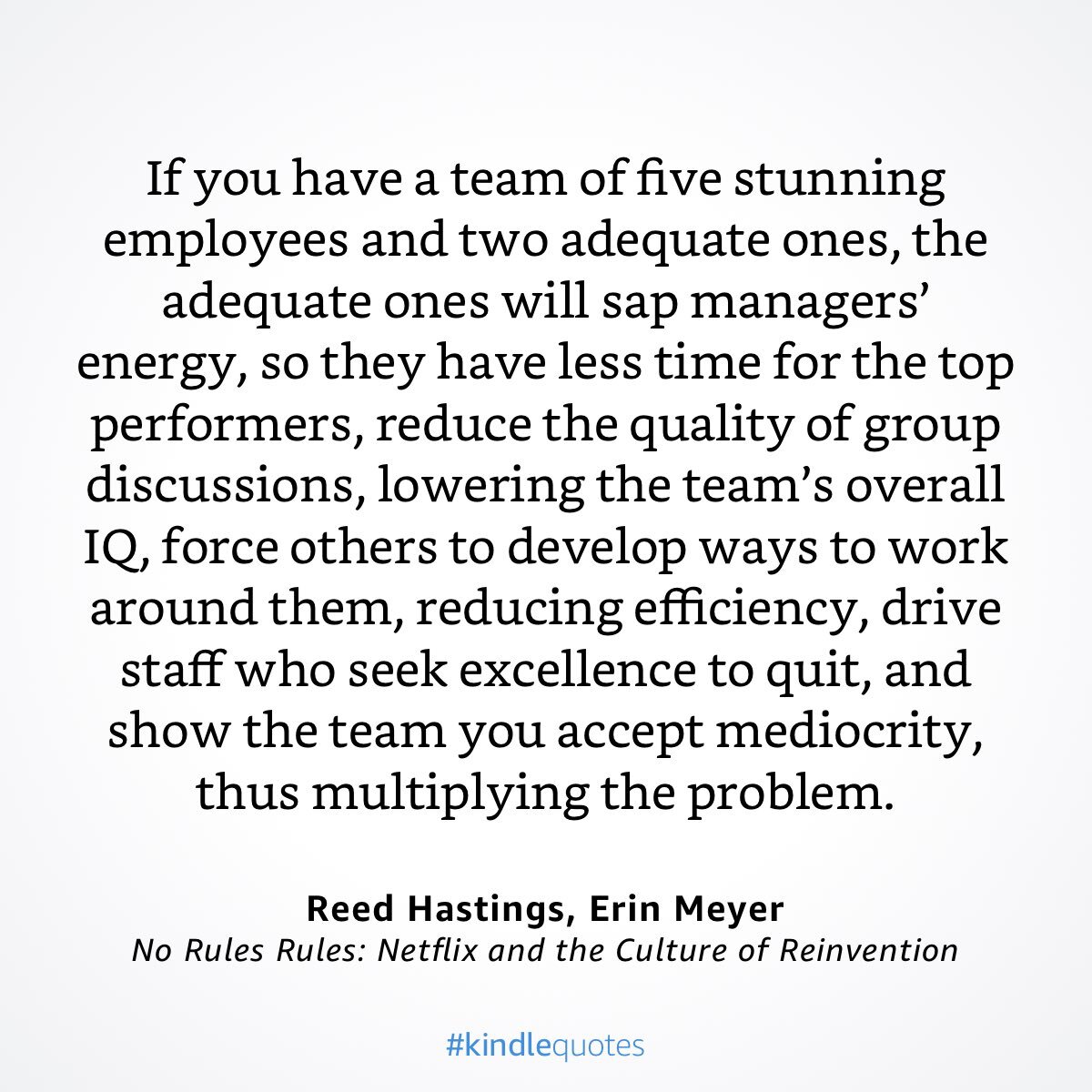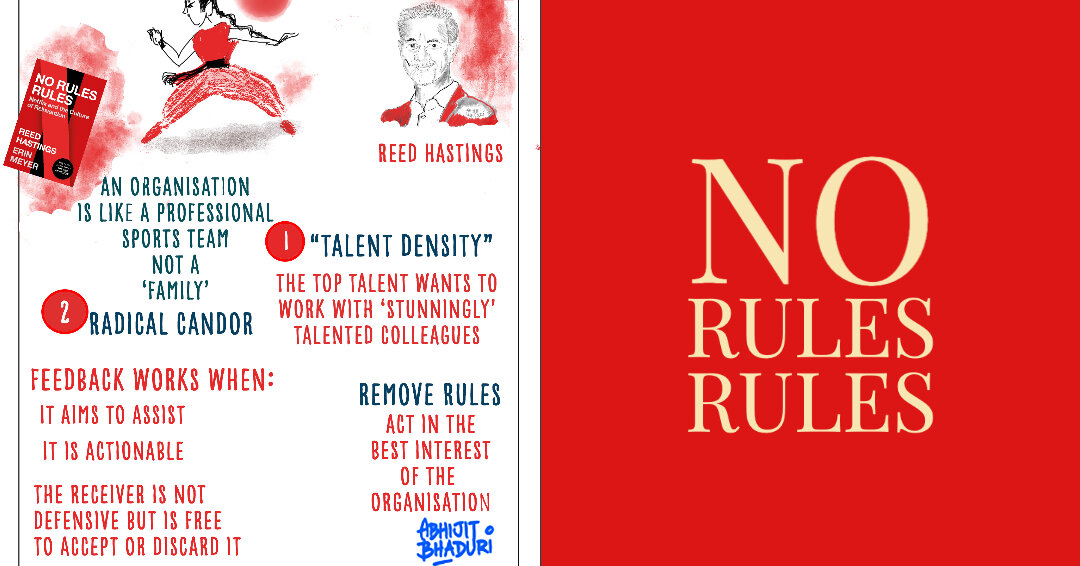Book Review: No Rules Rules by Reed Hastings and Erin Meyer
 No Rules Rules by Reed Hastings and Erin Meyer is a book about the culture of Netflix. Could it be that the workplace norms that exist today are archaic. They were formed in the early years of industrialisation and have remained unchallenged - until Netflix challenged many of the norms. That is what makes it a Market Shaper - a company that changes how we live and work. They are global, much like Netflix that operates in 190 countries.
No Rules Rules by Reed Hastings and Erin Meyer is a book about the culture of Netflix. Could it be that the workplace norms that exist today are archaic. They were formed in the early years of industrialisation and have remained unchallenged - until Netflix challenged many of the norms. That is what makes it a Market Shaper - a company that changes how we live and work. They are global, much like Netflix that operates in 190 countries.
Reinvented 4 Times Over
Can a workplace be run without any rules? That is what Netflix founder Reed Hastings talks about in his new book No Rules Rules - Netflix and the Culture of Reinvention. Netflix has reinvented itself four times over from being a company that started in 1997 sending DVDs by mail. They competed with Blockbuster. Reed and his co-founders offered to sell Netflix to Blockbuster for $50mn. Blockbuster laughed at them because they were making tonnes of money whenever viewers forgot to return the DVDs. Blockbuster went bankrupt in 2010. Netflix moved to streaming videos that was their second reinvention. Streaming services helped them know what the subscribers watch but also how, when, where, when they get bored and pause or when they're so excited they have to rewind and play the scene again. This led to their third reinvention of commissioning original content. More recently they started producing their own content - making it their fourth reinvention.Today 7900 employees of Netflix make $2.6 million each which nine times of Disney. Since the IPO, the share has gone up 500 times. Their shareholder value is three times of Google. Netflix is famous for its "Unlimited vacation" and no approvals culture. How does that work? There are two preconditions that make the no rules culture work.
Netflix moved to streaming videos that was their second reinvention. Streaming services helped them know what the subscribers watch but also how, when, where, when they get bored and pause or when they're so excited they have to rewind and play the scene again. This led to their third reinvention of commissioning original content. More recently they started producing their own content - making it their fourth reinvention.Today 7900 employees of Netflix make $2.6 million each which nine times of Disney. Since the IPO, the share has gone up 500 times. Their shareholder value is three times of Google. Netflix is famous for its "Unlimited vacation" and no approvals culture. How does that work? There are two preconditions that make the no rules culture work.
 No Rules Rule 1: Talent Density
No Rules Rule 1: Talent Density
Talent Density is all about constantly culling the average performer. Think of it as the dreaded bell-curve on steroids. The Netflix culture site says, "Our version of the great workplace is a dream team in pursuit of ambitious common goals, for which we spend heavily. It is on such a team that you learn the most, perform your best work, improve the fastest, and have the most fun."Reed Hastings describes colleagues as a professional sports team and NOT a family. The best talent wants to work with other top colleagues. So when the person is no longer performing at the desired level the firm pays him or her a severance package of 4-6 months of salary and lets them go. The ones who stay are paid the top salaries. They encourage their employees to constantly interview with competitors. If the person gets an offer, they can come back and tell their manager that they have an offer that pays them more. If the manager is happy to let you go, the employee leaves Netflix to join the new employer. Else Netflix gives the person more money to match the market offer.
No Rules Rule 2: Radical Candour
A creative environment needs everyone to give their ideas without holding back. To enable this, the boss has to set the standards. It is not your job to please the boss - say what is on your mind if it is the interest of Netflix. But feedback must meet four conditions:
- It must be intended to help the person
- It should be actionable
- The person (especially if it is the boss) must visibly appreciate the feedback
- The person is free to accept or discard the feedback
An Unabashed Conversation
Can you ever benchmark another company's culture? Listen to an 'unabashed' conversation that debates the merits of benchmarking and if that is the right place to start
No Rules Rule
If you have super-talented people, then you do not need to police them. Their colleagues hold each other accountable. In their much envied "unlimited vacations policy", the boss sets the tone by taking vacation (but not during peak season etc). Because the work output matters in creative work - not the number of hours. Actually that is also true for all kinds of work with remote teams. When someone misuses the freedom, they are ruthlessly fired. The same principle holds for travel policies, business expenses, hotel categories etc. If it is good for Netflix, do it. If you misuse the policy, you are instantly fired and made an example of (remember the principle of candour).
My recommendation
As Netflix moves to set up offices in countries outside US, both the principles of culling talent ruthlessly and radical candour will be tested. In many countries, it is hard to fire employees because of labour laws. The Asian culture believes a lot in 'saving face' - especially when it comes to telling someone that they are wrong or that their idea is not good enough or that they need to rework the proposal. But the book makes a sharp case that culture can drive profits. It is true that workplace norms have not been challenged for a hundred years. It may well be worth reading this book to reinvent the work culture a few times over. That is what makes Netflix a #MarketShaper in my upcoming book Dreamers & Unicornshttps://youtu.be/tCn4hdTI2jc



